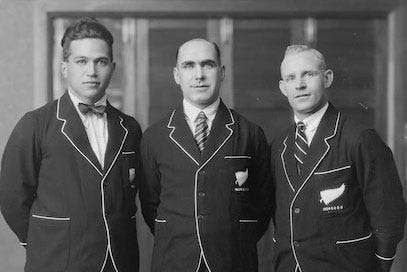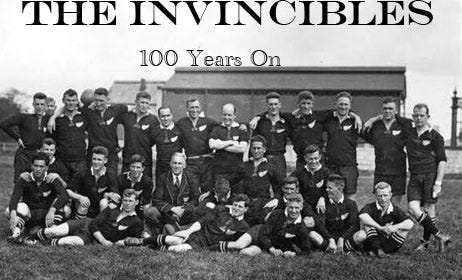14: Landfall at last for 1924-25 All Blacks
One hundred years ago, on September 13, the 1924-25 All Blacks made landfall in England, ready for the challenge of their lifetimes. Six weeks on board had left plenty of time for tactics preparation.
Not long after the Remuera cleared Wellington Heads and set sail for the Panama Canal, team manager and chairman of the New Zealand Rugby Union, S.S. 'Stan' Dean called the touring party together.
Given the intensity of interest generated through their trials programme, the pre-tour trip to Australia, the loss to Auckland, the administrative rumpus surrounding adding an extra player to the party, and the late change of captain, the players were finally able to relax away from the public's scrutiny and to focus on the task ahead.
George Nepia said they were glad to be on their way and out of 'sight and sound' of the unkind things said and written about them.
We soon ceased to care what had been said, and thought only of what we would try to do on the football fields of England, Ireland and Wales.
Our manager S.S. Dean called us into the lounge and said, in effect, 'Well, boys, we're going over to play football. You'll have plenty of time for other fun on the tour as well, but the consideration of football will come first. Agreed?[1]
Five-eighths Mark Nicholls said for the 12 weeks from the time they left for the NSW tour until they disembarked in England - June 27 until September 13 – the most significant portion of their time was spent studying rugby football.
We knew each other intimately. There were no 'reputation' men in the team, and the utmost cordiality existed among the twenty-nine players and manager. In our team talks aboard ship we found out how each man would act in certain circumstances, and many weird and wonderful theories were put forward before we finally decided upon a definite set plan in regard to defence.
From any set position as scrum or lineout each man knew what he was expected to accomplish. The attack, too, was set out, as far as it is possible to lay down set rules. A move in the game known to any member of the team was put on the blackboard, discussed, accepted or rejected. Thus, from the time we left New Zealand, we schemed and plotted to perfect our organisation, and ourselves for the strenuous games to come.[2]
George Nepia, captain Cliff Porter and Bill Dalley (Photo: National Library)
Nepia said the talks they had 'were so thorough, so detailed and so critically analysed that they made our record success assured before we ever sighted the shores of England!'[3]
Every known move of the rugby game was discussed from every point of view. We rehearsed all our moves over and over again theoretically, and thoroughly committed them to memory that our team understanding was complete days before we saw Plymouth, England. All that understanding was backed up with a team spirit which would have withstood anything, and did prove its ability to do so. There was that happy-family attitude that is essential in any team, and particularly needed by a touring side.[4]
While the All Blacks were undergoing their preparation, British and Irish fans had one eye on their British and Irish Lions performing in South Africa, and the other on published comments in their newspapers about what they might expect from the New Zealanders.
One comment after the 1923-24 Five Nations Championship was that nobody expected the 1924 All Blacks to do as well as they had in 1905. British rugby had improved considerably since then, and it was questionable New Zealand's form was as good. But on the question of whether England's play in the Five Nations would be enough to beat the All Blacks, the correspondent was in little doubt.
The New Zealand forwards will hold their own against Wakefield and his men, while the backs will make better use of their chances than England's opponents this season have done. The English inside backs will be superior to the New Zealanders, but, with a vigorous set of forwards to contend with, [halfback Arthur] Young and [centre Edward] Myers will be up against the hardest proposition of their careers. If they emerge triumphant, 'great' will be an inadequate work by which to describe them...England has a wonderful record in international fixtures in the last few years, but it must be remembered that she has yet to win against the Springboks, Wallabies, and All Blacks.
On Scotland's recent form, the All Blacks would win comfortably against them, but for some reason appreciated only by the Scottish authorities, there is no Test between the All Blacks and Scotland, it is unnecessary to pursue the subject further. France is likely to prove a dangerous opponent to the All Blacks in Paris, owing to the unorthodox nature of the French forward play. The Irish forwards should be a stiff proposition, but, unless Welsh form improves considerably, the All Blacks have a first-class chance of avenging the defeat of 1905 – and if this is done even a defeat by England would fade into insignificance. When England and the All Blacks meet at Twickenham on January 3, each team will be fighting hard to maintain a proud tradition and Twickenham 'luck' will have its final test.[5]
Another view of the tourists by a New Zealand correspondent in The Manchester Guardian was more emphatic.
New Zealand has got together this season a side that is sure to prove itself one of the greatest Rugby combinations the world has seen...We are far and away stronger now than when we met the Africans here, stronger than we have been for the last ten years.[6]
New Zealander George Aitken, the All Blacks' captain in the first two Tests against the 1921 Springboks, debuted for Scotland in the Five Nations while on his Rhodes Scholarship. Having seen the rugby in England, especially, he felt rugby was in pretty good shape, and the All Blacks forwards would handle themselves well but he wondered about the backs.
The standard of back play here, except in Wales, is high, and it is of no use sending a 'crook' back division. When I left New Zealand I was given to understand that the English players were not very good exponents of the rugby game, but such is not the case. They have learnt a lot from Colonial teams.[7]
Aitken was set to play for Oxford against the All Blacks, in the three-quarter line with, McPherson, the Australian Rhodes Scholars Johnny Wallace, and the fullback R.L. 'Pup' Raymond. Both the Australians had toured New Zealand with New South Wales. Aitken said while Scotland lost 0-19 to England in the Five Nations, the score was not a reflection of the game.
As for how the deeds of the touring side would be reflected in New Zealand, it is fair to say the All Blacks had the benefit of their largest home-grown press group with them. R.A. 'Ron' Barr, who covered the visits to New Zealand of the 1904 British team and the 1908 Anglo-Welsh side when based in Dunedin had moved to Auckland and was covering the tour. He produced a pre-tour souvenir publication for sale in New Zealand and Britain and was contracted by several New Zealand papers. Arthur Carman, a public servant, had taken time off his job to follow the tour. It was the first part of his career that would see him become synonymous with the annual production of the Rugby and Cricket Almanacks of New Zealand, initially in partnership with 1924 All Black Read Masters, and Arthur Swan. Discarded All Blacks halfback H.E. 'Ginger' Nicholls followed the tour writing a weekly column for the NZ Free Lance while 1905-06 All Black fullback E.E. 'General' Booth covered the tour for NZ Truth. A former reporter from The Press, A.J. Harrop[8], was studying in England and he wrote columns for The Press during the tour.
NEXT ISSUE: Scotland wae hae!
[1] George Nepia, Rugby Every Time, NZ Truth, 21 October 1936
[2] Mark Nicholls, Weekly News, 11 September 1935
[3] Nepia, NZ Truth, ibid
[4] Nepia ibid
[5] The Observer, published by Southland Times, 24 May 1924
[6] Special correspondent, Manchester Guardian, 13 July 1924
[7] G.G. 'George' Aitken, letter to Wellington friend, published in Evening Post, 28 June 1924
[8] A.J. Harrop was a former Press journalist who worked part-time while at Canterbury University College before he left for England in 1923. He completed a PhD at Caius College at Cambridge University. He founded the newspaper for New Zealanders in England, New Zealand News in 1927 and wrote several books on New Zealand history.




